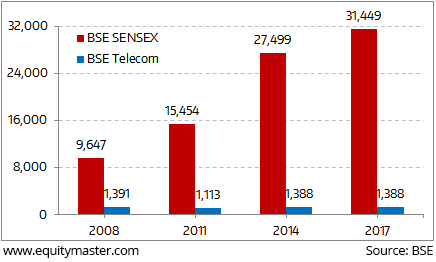After opening the day in green, share markets in India have continued the momentum and are presently trading near all-time high levels. All sectoral indices are trading in green stocks in the pharma sector and stocks in the realty sector leading the gains.
The BSE Sensex is up by 200 points (up 0.6%) and the NSE Nifty is trading up by 60 points (up 0.6%). Meanwhile, the BSE Mid Cap index is trading up by 0.9%, while the BSE Small Cap index is trading up by 1%. The rupee is trading at 63.35 to the US$.
In news from stocks in the telecom sector. Bharti Airtel share price is in focus today after the banking arm of the telecom major - Airtel Payments Bank - terminated relationships with nearly 1,000 retailers for not following the due process while signing up customers.
UIDAI earlier had asked Reserve Bank of India (RBI), Department of Telecom (DoT) and audit and consultancy firm PricewaterhouseCoopers India to conduct an audit of Bharti Airtel with respect to its systems, processes, applications, documentations and any other aspect as may be identified by RBI and DoT to ensure that the company is in compliance with its licence conditions.
UIDAI then conditionally allowed the company to conduct Aadhaar-based e-KYC verification for mobile subscribers till January 10, 2018. The decision to provide a temporary reprieve to Airtel was taken after Rs 1.3 billion of funds under the direct benefit transfer scheme were credited back to the original accounts of 5.5 million beneficiaries.
UIDAI last week had temporarily suspended Airtel and its payments bank from conducting Aadhaar-based verification of its mobile customers as well as those of the bank using the e-KYC process. And asked the company to deposit Rs 250 million as penalty with UIDAI.
In related news, India's top four telecom services providers are vying to sign up more than 150 million mobile users who may be looking to port their numbers, thanks to a rapid consolidation that has seen Reliance Communications and Tata Teleservices exiting the market, and Aircel shrinking operations.
According to data from the Telecom Regulatory Authority of India (TRAI), Tata Teleservices, which is in the midst of a merger with Bharti Airtel, had 40.2 million subscribers at the end of October 2017. Aircel, which shut shop in six circles, had 88.3 million customers and Reliance Communication, which closed its wireless services in November, had 61.2 million users.
Telecom Sector: A decade of Underperformance
The whole telecom business has been an underwhelming story so far. While the telecom subscriber base has increased from 300 million in 2008 to 1.2 billion in 2017, investors have little to cheer. The BSE Sensex has gone up 3.25 times in nine years, but the BSE Telecom Index has not moved an inch from its levels of 2008.
With the entry of Reliance Jio, the competition has intensified further. Reliance Jio's low cost offerings and strategy of capturing market share will further dent the sector. The sector has been a classic 'value trap'. While it always looks cheap compared to other sectors, it has failed to provide any reasonable returns. We also believe the situation is unlikely to change in the near future. For an investor, it's important to differentiate between 'value' and 'value traps'.
At the time of writing, Bharti Airtel share price was trading down by 4%.
Moving on to news from the banking sector. According to a leading financial daily, willful defaulters make up a chunk of the bad loans faced by public sector banks (PSBs).
The total gross non-performing assets (NPAs) of the 21 PSB in India stood at Rs 7.3 trillion as on 30 September 2017. Loans attributed to willful defaults were around Rs 1 trillion, making up about 14% of the total NPAs.
Recovery from such accounts are difficult because in many cases the money is siphoned off from the books of the defaulting company and most of them are being fought in courts. Some of the largest cases of willful default are Kingfisher Airlines, Zoom Developers, Winsome Diamonds and Varun Industries.
Of the 9,025 cases of willful defaults in PSU banks, lenders have filed cases against 8,423 for recovery of Rs 953 billion of NPAs. They have also filed 1,968 police complaints in cases of loan amounts totaling 318 billion.
In 6,937 accounts, representing an outstanding of Rs 875 billion, banks have also initiated proceedings to attach and sell assets under the Securitisation and Reconstruction of Financial Assets and Enforcement of Security Interest Act.
If the trend of rising bad loans continues, there's a painful road ahead for the banking sector. The RBI expects the average GNPA ratio to increase to 10.2% by March 2018. It indicated that if macroeconomic conditions worsen, this number could go up.
Although RBI is showing urgency in tackling the NPA issue, a lot more needs to be done by lenders too to stop the rot.
This article was originally published in English at www.equitymaster.com
Read the complete Indian stock market update. For the terms of use, go here.

Nice Article!Thanks for sharing your valuable information. I think its worked. But, can you suggest me a best way to make money with trading or any other ways?
ReplyDeleteescorts ltd share price
today's intraday stocks
concept of share market
bharti airtel share price
icici asset management
cholamandalam
pathlabs
ashoka buildcon share price